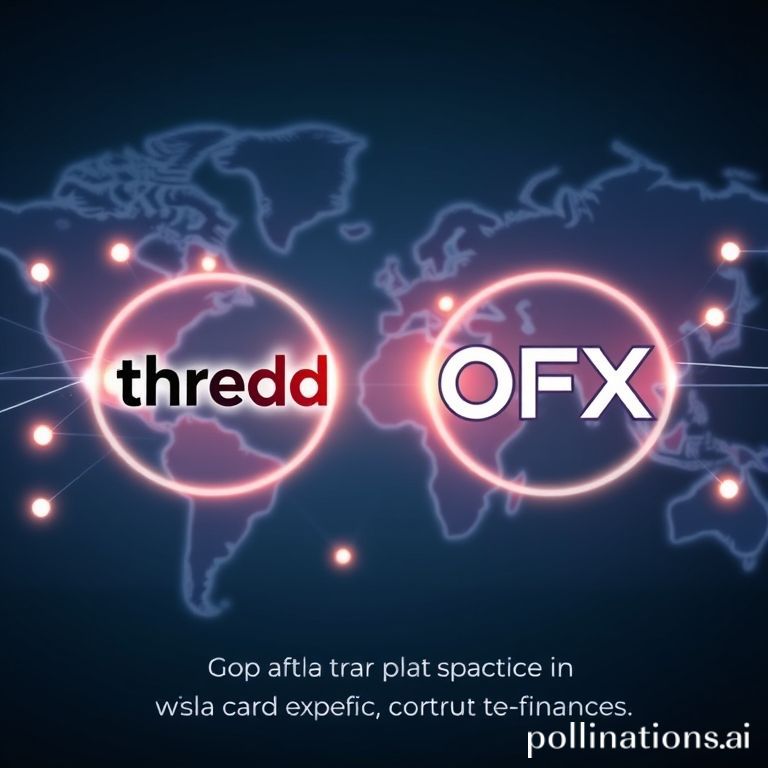OFX Expands US Corporate Cards with Thredd Partnership

Thredd, a leading payments processor, has significantly strengthened its collaboration with OFX, a specialist in card, payment, and foreign exchange services. This expanded partnership marks a crucial step for OFX as it extends its corporate card offerings into the United States and parts of the Asia Pacific region, building upon its successful ventures in Australia, Canada, and Europe. The alliance underscores a strategic move to provide businesses with more robust and globally integrated financial tools.
Enhancing Global Corporate Card Programs
At the core of this partnership, Thredd provides the essential "processing backbone" for OFX's corporate card programs. This includes critical compliance expertise and comprehensive in-market support, which are vital for navigating the complex regulatory landscapes of new territories. With Thredd's infrastructure, OFX is empowered to deliver sophisticated physical and virtual corporate card solutions. These solutions come equipped with advanced features such as real-time spend controls, ensuring businesses maintain precise oversight of their expenditures. Furthermore, the integration of automated expense management streamlines financial operations, reducing manual effort and improving accuracy. A standout capability is the multi-currency functionality, which is indispensable for companies operating across international borders, facilitating seamless transactions in various global currencies.
Jim McCarthy, CEO of Thredd, highlighted the efficiency and global reach that his company brings to the table. “With a single platform and global reach, Thredd is helping OFX bring powerful, enterprise-grade card programmes to market quickly and compliantly,” McCarthy stated. He further emphasized the seamless nature of international expansion when supported by the right platform, people, and partnerships, positioning Thredd as a pivotal enabler for such growth. This sentiment reflects a shared vision of simplifying complex financial processes for businesses striving for international prominence.
Technological Advancements and Fraud Prevention
Beyond core processing, OFX has also strategically adopted Thredd’s advanced tools for monitoring fraudulent transactions. In an era where financial fraud is a persistent threat, robust security measures are paramount. Thredd's fraud monitoring capabilities provide an additional layer of protection, safeguarding corporate assets and enhancing trust in the payment ecosystem. This proactive approach to security is crucial for maintaining the integrity and reliability of corporate card programs, ensuring that businesses can operate with peace of mind.
Jaco Veldsman, Head of Non-FX at OFX, praised the collaborative effort, noting that Thredd’s dedicated team, deep expertise, and robust infrastructure have been instrumental in allowing OFX to rapidly launch and scale a comprehensive platform. This platform integrates card issuing, spend management, foreign exchange (FX) services, and general payments into a cohesive unit. Veldsman articulated the significant advantage of having a single partner for multi-region expansion, stating, “With a single partner supporting our multi-region expansion, we can focus on delivering smarter, more secure, and more connected payment experiences for our clients worldwide.” This holistic approach allows OFX to concentrate on enhancing client experience rather than managing disparate technological components.
The Future of Payments: Agentic AI and Intelligent Orchestration
The discussion around this partnership also sheds light on broader technological trends shaping the future of payments. Earlier this year, PYMNTS engaged in a conversation with Edwin Poot, Chief Technology Officer at Thredd, about the company’s pioneering efforts in leveraging agentic artificial intelligence (AI). Thredd is actively assisting banks and FinTechs in exploring intelligent transaction orchestration, a concept that moves beyond traditional automation to achieve unprecedented levels of efficiency and significantly enhance customer experience.
Agentic AI represents a paradigm shift, aiming to redefine how financial institutions issue and manage cards, optimize real-time decisions, and combat increasingly sophisticated forms of fraud. This transformative approach charts a course toward a more responsive and adaptive financial ecosystem. The integration of AI promises to unlock new potentials for personalization, security, and operational fluidity, making financial transactions not just faster, but also smarter and more contextually aware.
However, Poot also underscored the substantial challenges inherent in this technological evolution, particularly concerning the foundational infrastructure required for widespread AI deployment. He pointed out a common oversight: the underestimation of these infrastructural demands. “I think what people usually tend to forget is … once this takes off and you’ll deploy agents per transaction, this will require changes to the infrastructure and the ways in which you manage those agents. People can underestimate that,” Poot explained in the “What’s Next in Payments” series. This highlights the critical need for robust, scalable, and adaptable technological frameworks to truly harness the power of agentic AI within the financial sector.
Conclusion
The expanded partnership between Thredd and OFX is a testament to the evolving landscape of global financial services. By combining Thredd’s robust processing capabilities and compliance expertise with OFX’s extensive reach and client-centric approach, the two companies are set to offer an unparalleled corporate card experience to businesses worldwide. This collaboration not only facilitates OFX's strategic expansion into key markets like the US and Asia Pacific but also demonstrates the profound impact of advanced payment technologies and intelligent AI solutions in shaping the future of finance. As businesses continue to globalize, partnerships like this become indispensable for fostering secure, efficient, and interconnected payment ecosystems that meet the dynamic demands of a modern economy.
